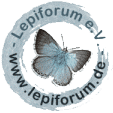

 +2Kontinente:EU
+2Kontinente:EU2. Biologie
2.1. Nahrung der Raupe
Noch unbekannt! Corley (2014) geht davon aus, dass die Raupe in Blättern immergrüner Eichen entwickelt, nach den Falter-Fundstellen in Portugal wahrscheinlich in Quercus faginea (Portugiesische Eiche).
3. Weitere Informationen
3.1. Etymologie (Namenserklärung)
Corley (2014) erläutert: "The species name conimbricensis is a Latin word in Genitive singular literally meaning `belonging to Coimbra’ after the Roman name of Coimbra, Conimbrica. The site Santa Clara is just outside Coimbra, while the other two Portuguese localities for the new species are within 30 kilometres of the city."
3.2. Typenmaterial
Zur Typenserie ist bei Corley (2014) zu erfahren:
"Holotype (Plate 1): ♂, “Portugal | Ansião | Beira Litoral | 13.iv.2014 | J. Rosete” “4171 m | M. Corley | Gen. prep.”.
Paratypes: ♂♂, “Portugal | Ansião | Beira Litoral | 03.v.2013 | J. Rosete” “4092 m | M. Corley | Gen. prep.”; “Portugal | Ansião | Beira Litoral | 13.iv.2014 | J. Rosete” “4174 m | M. Corley | Gen. prep.”. ♀♀, “P7493 | Portugal | Santa Clara | Coimbra | Beira Litoral | 12.v.2006 | M.F.V. Corley” “♀ 2586”; “P8285 | Portugal | Santa Clara | Coimbra | Beira Litoral | 9.ix.2006 | M.F.V. 230 Entomologist’s Rec. J. Var. 126 (2014) Corley” “♀ 2720”; “P8855 | Cast.[elo de] Rabaçal | Serra de Sicó | Beira Litoral | 27.ix.2008 | M.F.V. Corley” “♀ 3148”.
Weitere untersuchte Tiere aus Cádiz (Spanien) wurden nicht mit in die Typenserie aufgenommen.
3.3. Faunistik
Nach Corley (2014) ist die neue Art bisher nur von 3 Stellen im Umkreis von 30 km um Coimbra (Portugal) und von 2 Stellen in Südspanien (Cádiz, Palencia) bekannt. Da die Tiere äußerlich nicht (oder zumindest nicht sicher) von Caloptilia alchimiella und Caloptilia robustella zu unterscheiden sind, ist eine weitere Verbreitung im Mediterranraum aber nicht ausgeschlossen.
(Autor: Erwin Rennwald)
3.4. Literatur
- Erstbeschreibung: Corley, M. (2014): Five new species of microlepidoptera from Portugal. – Entomologist’s Record and Journal of Variation 126: 229 - 243.




